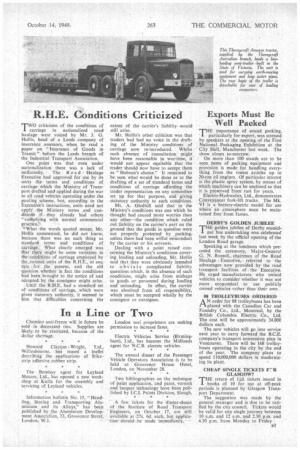R.H.E. Conditions Criticized
Page 35

If you've noticed an error in this article please click here to report it so we can fix it.
TWO criticisms of the conditions of carriage in nationalized road haulage were voiced by Mr. J. G. Hollis, head of a Leeds company of insurance assessors, when he read a paper on "Insurance of Goods in Transit" before the Leeds branch of the industrial Transport Association.
One point was that even under nationalization there was a lack of
uniformity. The R oad Haulage Executive had approved for use by its units the terms and conditions of carriage which the Ministry of Transport drafted and applied during the war to all road vehicles operating under the pooling scheme, but, according to the -Executive's instructions, units need not apply the Ministry terms and conditions if they already had others " corimlying with normal commercial practice," • 4-What the words quoted meant, Mr. Hollis commented, he did not know, because there was no such thing as standard terms and conditions of carriage. What clearly emerged was that there might be some variation in the conditions of carriage employed by the ,various units of the R.H.E., at any. rate for thel present, and the old question whether in fact the conditions had been, brought to the notice of and accepted. by the consignor might arise.
Until the R.H.E. had a standard set of conditions of carriage, which were given statutory authority, it seemed to him that difficulties concerning the extent of the carrier's liabilitywould still arise.
Mr. Hollis's other criticism was that traders had had no voice in the drafting of the Ministry conditions of carriage now re-introduced. • Whilst such absence of consultation might have been reasonable in war-time, it would not appear equitable that the trader should now have to accept them as "Hobson's choice." It remained to be seen what would be done as to the drafting of a set of standard terms and conditions of carriage affording the trader representation on any committee set up for that purpose, and giving statutory authority, to such conditions.
MT. A. Gledhill said that in the Ministry's conditions was one which he thought had caused more worries than any other—the condition which ruled out liability on the carrier's part on the ground that the goods in question were not properly protected by packing, unless there had been wilful misconduct by the carrier or his servants.
Dealing with a point raised concerning the Ministry's conditions covering loading and unloading, Mr. Hollis said that they were obviously intended to o b viate complicated liability questions which, in the absence of such conditions, might arise from mishaps to goods or personnel during loading and unloading. In effect, the carrier was absolved from all responsibility, which must be accepted wholly by the consignor or consignee.




























































































